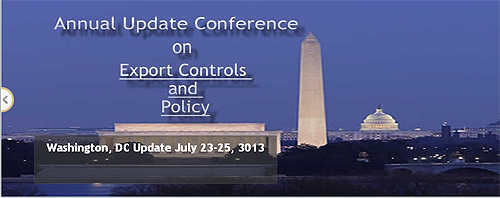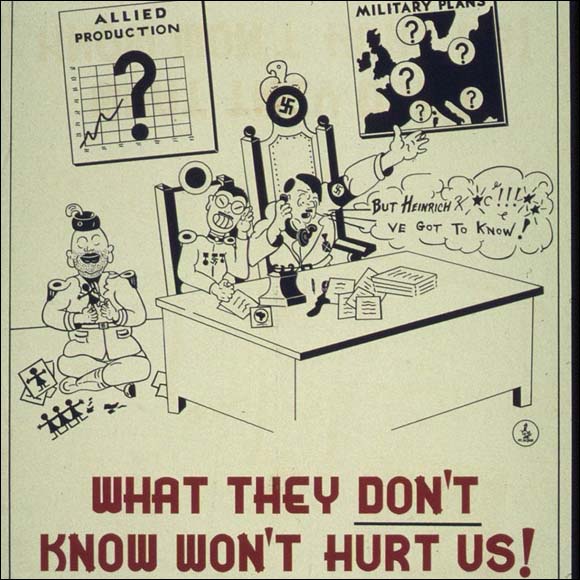
Regrettably, I doubt that I will be able to attend.
 Posted by Clif Burns at 1:29 pm on March 5, 2013
Posted by Clif Burns at 1:29 pm on March 5, 2013 Category: BIS
Category: BIS
 Permalink
Permalink  Comments (4)
Comments (4)
 Posted by Clif Burns at 5:09 pm on March 1, 2013
Posted by Clif Burns at 5:09 pm on March 1, 2013 Category: EU • Iran Sanctions
Category: EU • Iran Sanctions
 The General Court of the European Court of Justice on February 5 set aside the sanctions that the European Union had imposed on Bank Saderat of Iran. (Bank Saderat was blocked in the United States by the Office of Foreign Assets Control in 2008 under the provisions of Executive Order 13382, meaning that U.S. persons are forbidden to engage in any transactions with the bank and that any of the bank’s assets that come into the possession or control of a U.S. person must be blocked.)
The General Court of the European Court of Justice on February 5 set aside the sanctions that the European Union had imposed on Bank Saderat of Iran. (Bank Saderat was blocked in the United States by the Office of Foreign Assets Control in 2008 under the provisions of Executive Order 13382, meaning that U.S. persons are forbidden to engage in any transactions with the bank and that any of the bank’s assets that come into the possession or control of a U.S. person must be blocked.)
The E.U. Court relied on a number of largely procedural arguments to overturn the E.U. sanctions on Bank Saderat, but two substantive arguments were also relied on by the court, both of which were dubious at best. First, the Court argued that Bank Saderat was no longer owned by the Iranian government and that the 94% share held by the government at the time of the E.U. sanctions had been reduced to a minority position. In fact, according to publicly available documents, the Iranian government is still the largest single shareholder of the bank.  Moreover, the Iranian government’s prior holdings were  spun off to other Iranian government entities.  As a result,   some have forcefully alleged that this was a “fake privatization” and a “scam” designed to escape international sanctions on the bank.
The second substantive ground cited by the E.U. Court was even more preposterous. At issue is whether the bank provided banking services to Iranian entities involved in Iran’s nuclear program. In this regard, Bank Saderat admitted that it processed letters of credit for two companies engaged in nuclear proliferation but argued that these were “ordinary banking services … and that those services did not relate to transactions linked to nuclear proliferation.” It’s hard to understand how this “ordinary banking service” argument would not provide a “get out of jail free” card to any Iranian bank providing services to nuclear proliferators. All banking services can likely be characterized as “ordinary” in some sense, and it is doubtful that any bank is engaged in extraordinary services directly related to proliferation. What would such services be? Does the bank have provide advice on the construction of enrichment centrifuges before it can be sanctioned? And how do you determine what transactions are or are not related to the proliferation activity?
The Court did, however, reject Bank Saderat’s argument, premised on diplomatic cables published by Wikileaks, that the sanctions were the result of undue pressure exerted on European governments by the United States Government. The court noted:
[A]s regards the diplomatic cables, the fact that some Member States were subject to diplomatic pressure, even if proved, does not imply, by itself, that such pressure affected the contested measures which were adopted by the Council or the assessment carried out by the Council when they were adopted.
The E.U. Court’s action here followed closely on earlier action in the last week of January by the Court striking down the E.U. sanctions on Iran’s Bank Mellat
 Permalink
Permalink  Comments Off on E.U. Court Overturns Sanctions on Iranian Bank
Comments Off on E.U. Court Overturns Sanctions on Iranian Bank
 Posted by Clif Burns at 4:26 pm on February 26, 2013
Posted by Clif Burns at 4:26 pm on February 26, 2013 Category: General
Category: General
 This is a slightly off-topic post, but since many export professionals also have security clearance issues in their portfolio, I think they might find this post interesting. I also make a labored attempt to find an export law connection in the last paragraph of this post for any traditionalists out there.
This is a slightly off-topic post, but since many export professionals also have security clearance issues in their portfolio, I think they might find this post interesting. I also make a labored attempt to find an export law connection in the last paragraph of this post for any traditionalists out there.
The following item ran as a letter to the editor in today’s Washington Post:
Kudos to John Hamre [“This is no way to weed out spies,†Washington Forum, Feb. 22] for taking on some of the absurdities in how our government investigates candidates for security clearances.
During the most recent investigation into my own clearance renewal, the responsible agency refused to sign off. The reason? I had failed to file a foreign-contact report on an English-born woman I had known for many years and with whom I am still close. At that point in time, I had held a top clearance for more than 20 years and had served in several positions of significant trust. I had even disclosed the relationship on my application, but the government was correct: I had never filed that report.
I asked for a waiver on the grounds that she was naturalized in 1955 and had therefore been an American longer than me, even providing a copy of her naturalization certificate. It was all to no avail, however, so I dutifully filed a report disclosing that I was in regular contact with my mother. My clearance was renewed a few weeks later.
If this kind of thinking from the federal government is encountered in gauging compliance by foreign licensees with the (relatively) new dual national rules, no one will ever rely on the exception in those rules for certain foreign dual nationals. Those rules require foreign licensees to determine whether foreign dual nationals with one nationality in an embargoed country have too much contact with other persons in the embargoed country. If a foreign national still talks to his mother in, say, China, then there could be trouble. Maybe it’s okay if the employee in that situation just sends his mom a card on Mother’s Day and leaves it at that. Phone calls and trips home, however, are out of the question.
 Permalink
Permalink  Comments (3)
Comments (3)
 Posted by Clif Burns at 5:18 pm on February 22, 2013
Posted by Clif Burns at 5:18 pm on February 22, 2013 Category: Iran Sanctions • SEC
Category: Iran Sanctions • SEC
 Section 219 of the Iran Threat Reduction and Syria Human Rights Act of 2012 (“ITRSHRA”) requires that publicly-traded companies disclose in their annual and quarterly filings with the Securities and Exchange Commission (“SEC”) certain dealings that the filers or any of their “affiliates” have had with Iran during the reporting period. Among the transactions required to be reported are any transactions with the Government of Iran “without the specific authorization of a Federal department or agency.”
Section 219 of the Iran Threat Reduction and Syria Human Rights Act of 2012 (“ITRSHRA”) requires that publicly-traded companies disclose in their annual and quarterly filings with the Securities and Exchange Commission (“SEC”) certain dealings that the filers or any of their “affiliates” have had with Iran during the reporting period. Among the transactions required to be reported are any transactions with the Government of Iran “without the specific authorization of a Federal department or agency.”
There is no materiality or dollar amount threshold to this obligation to report dealings with Iranian government.  As a result, this obligation  seemingly extends to even the most trivial transaction, including legal transactions by foreign “affiliates” that are not controlled by U.S. persons and are therefore not subject to the prohibitions of section 218 of ITRSHRA
With that in mind, we have the latest Form 10-Q filed by Toyota Motor Credit Corporation (“TMCC”) which discloses that in the last quarter of 2012 an Indonesian subsidiary of Toyota Motor Company (“TMC”), a Japanese company, manufactured two automobiles worth $37,000 which another Indonesian subsidiary of TMC sold to the Iranian Embassy in Jakarta.
Because the two Indonesian companies were not controlled by TMCC these sales weren’t prohibited by Section 218 of ITRSHRA. Further, because the two cars were manufactured in Indonesia, they weren’t otherwise subject to the U.S. sanctions given that they likely had less than 10 percent U.S. origin controlled content. But since TMCC and the two Indonesian companies were under common control of TMC, they were “affiliates” of TMCC (as defined by Exchange Act Rule 12b-2), meaning that these miniscule transactions had to be reported by TMCC.
It is not clear what purpose is served by requiring companies to report such stuff other than, I suppose, to impose the regulatory hassle on any and every public company to ferret out penny ante deals by distant foreign affiliates with Iran. I, for one, look forward to upcoming revelations of, say,  some U.S. company that has an affiliated foreign grocery store chain that sold a loaf  of bread to an Iranian diplomat in Vilnius.
 Permalink
Permalink  Comments Off on First SEC Iran Disclosures Unearth Sale of Two Cars to Iranian Embassy
Comments Off on First SEC Iran Disclosures Unearth Sale of Two Cars to Iranian Embassy
 Posted by Clif Burns at 5:01 pm on February 21, 2013
Posted by Clif Burns at 5:01 pm on February 21, 2013 Category: Cuba Sanctions
Category: Cuba Sanctions
 It appears that the Department of State may be considering removing Cuba from the list of state sponsors of terrorism. The immediate impact of this will be howls of outrage from the rabid Babalú crowd and other die-hard supporter of Cuba sanctions. Of course, of more interest to the readership of this blog will be the practical impact of such a removal, if it occurs, on exports to Cuba.
It appears that the Department of State may be considering removing Cuba from the list of state sponsors of terrorism. The immediate impact of this will be howls of outrage from the rabid Babalú crowd and other die-hard supporter of Cuba sanctions. Of course, of more interest to the readership of this blog will be the practical impact of such a removal, if it occurs, on exports to Cuba.
If you think that the removal of Cuba from the list will permit unlicensed exports of food, medicine and agricultural goods to Cuba, think again. Although section 7205 of the Trade Sanctions Reform and Export Enhancement Act of 2000 (“TSRA”) does indeed impose a license requirement on shipments of these goods to state sponsors of terrorism, it also directly imposes that restriction on TSRA exports to Cuba. So a license will still be required even if Cuba is removed from the list.
Section 40 of the Arms Export Control Act prohibits granting licenses for the export of items on the United States Munitions List to state supporters of terrorism. So there is a theoretical possibility, I suppose, that if Cuba is removed from the list, the arms embargo against Cuba might also be lifted. Right. When pigs fly.
Then we have Section 6(j) of the now-defunct Export Administration Act as allegedly extended in force by various executive orders. Â That provision requires that certain licenses for exports of goods on the Commerce Control List to state sponsors of terrorism be notified to Congress. Since licenses for CCL items are rarely granted in any event for Cuba, and seem unlikely to be granted even if Cuba is removed from the list, this doesn’t seem to an area in which Cuba’s removal would have much impact.
In sum, removal of Cuba from the list seems largely symbolic and with little practical effect. At most, it could presage a liberalization of the embargo down the road, particularly if the current Cuban government gnaws on this bone a little rather than simply regarding it with disdain.
 Permalink
Permalink  Comments (1)
Comments (1)


To subscribe to email notices
of new posts, click the
following link:
If you subscribed prior to January 4, 2011, unsubscribe
to email notices of new posts
by clicking the following link:
All other subscribers can unsubscribe by clicking the unsubscribe link in notification emails.